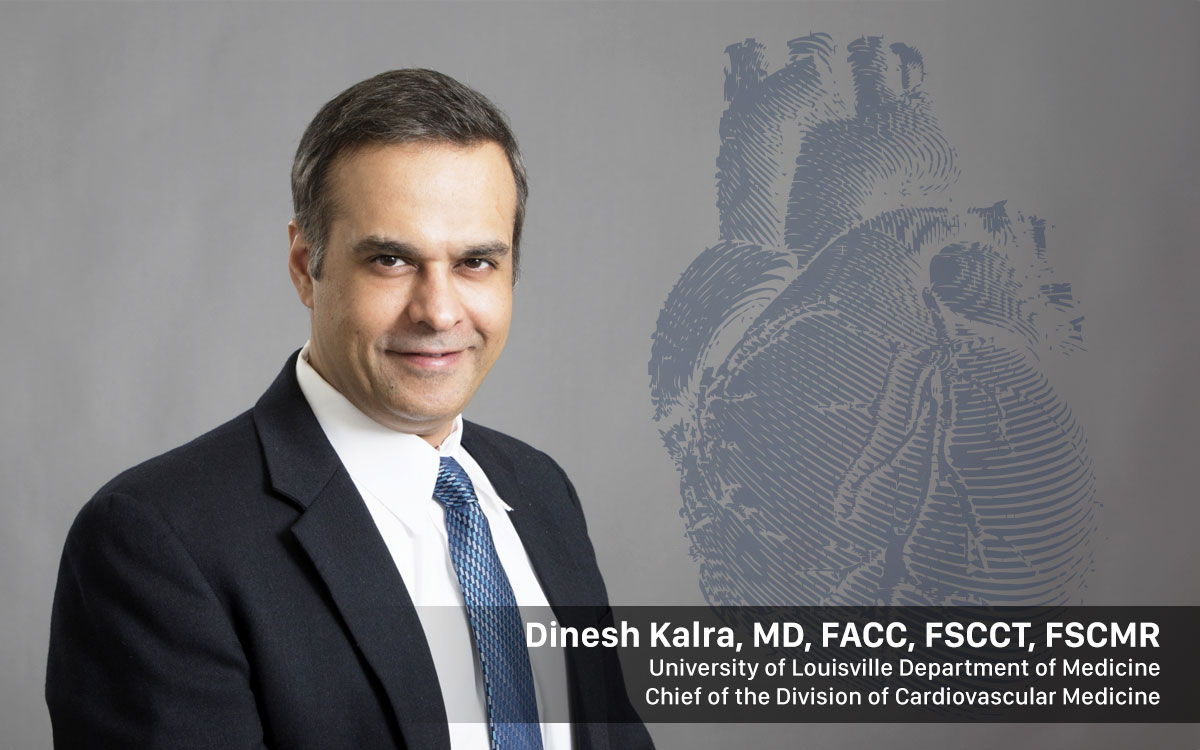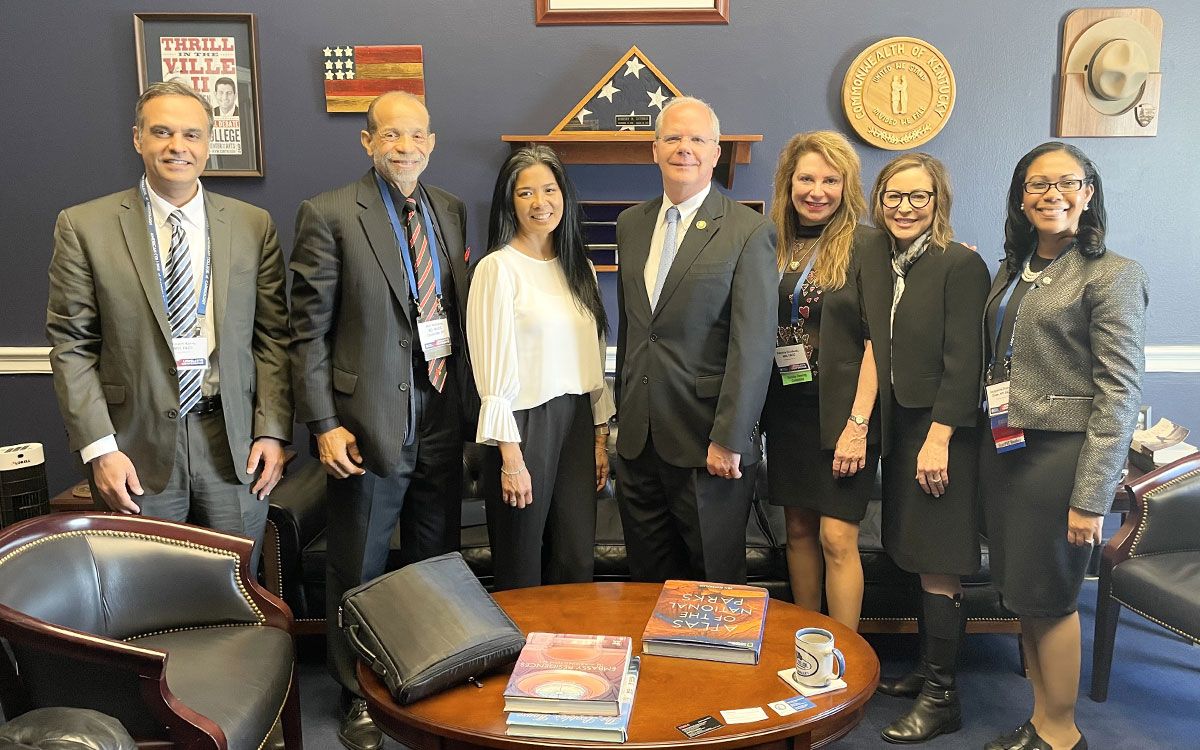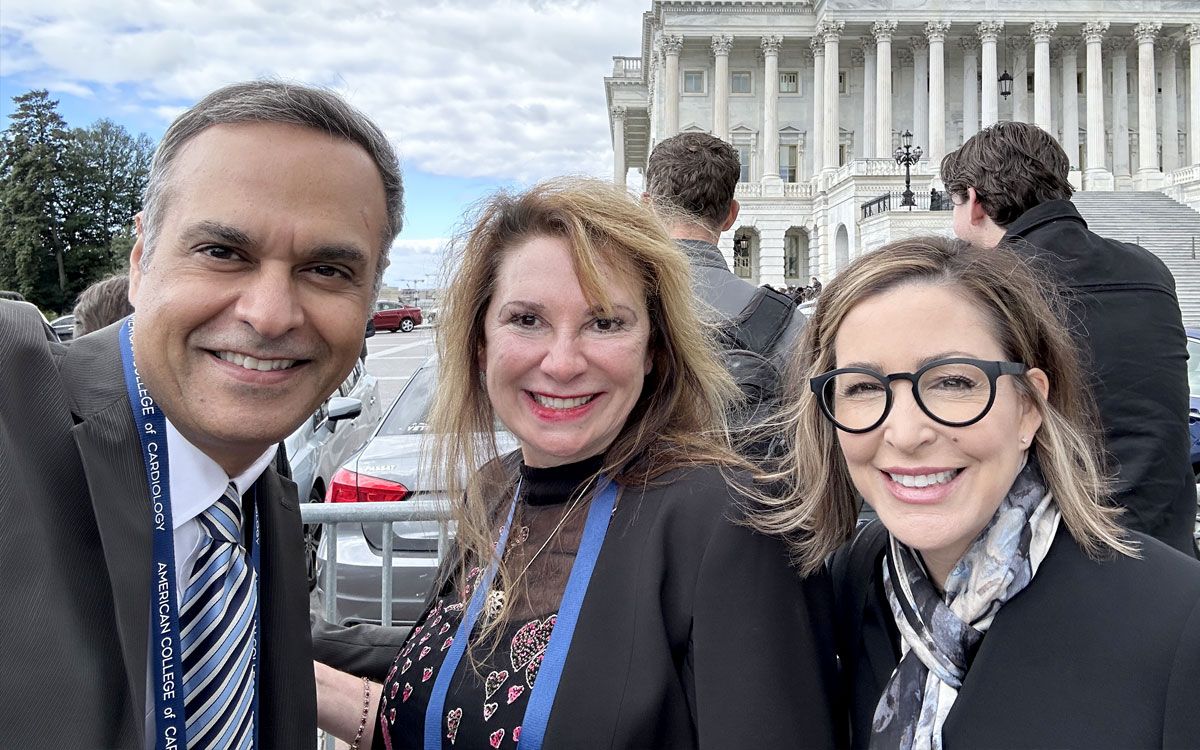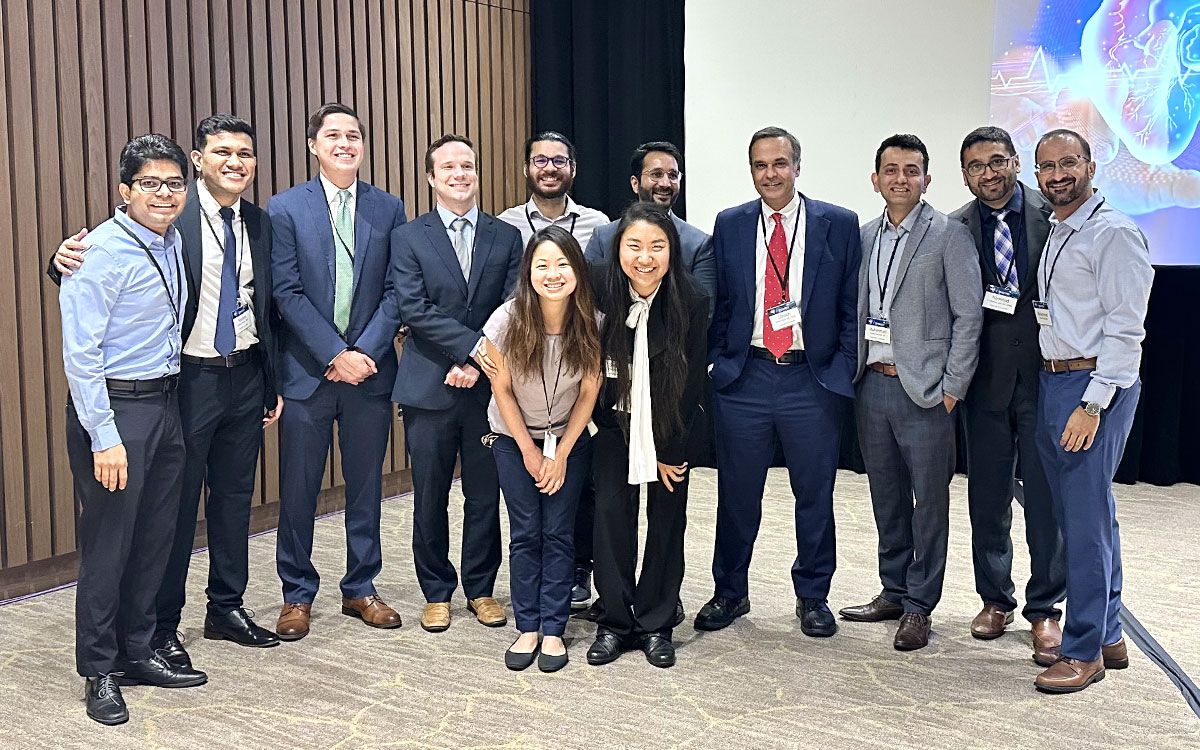Cardiology in the Commonwealth — An Interview with Kentucky ACC Governor, Dr. Dinesh Kalra
 The Kentucky Chapter of the American College of Cardiology (KYACC) is pleased to welcome Dinesh Kalra, MD, FACC, FNLA, FSCCT, FSCMR as the 2024-2027 Governor of the KYACC. In addition to his volunteer service, Dr. Kalra serves as the Chief, Division of Cardiovascular Medicine, Vice Chair for Quality, Department of Medicine, Professor of Medicine & Endowed Chair in Cardiovascular Innovations, and the Director of Advanced Cardiac Imaging, Lipid Clinic & Infiltrative Heart Disease Program at the University of Louisville School of Medicine.
The Kentucky Chapter of the American College of Cardiology (KYACC) is pleased to welcome Dinesh Kalra, MD, FACC, FNLA, FSCCT, FSCMR as the 2024-2027 Governor of the KYACC. In addition to his volunteer service, Dr. Kalra serves as the Chief, Division of Cardiovascular Medicine, Vice Chair for Quality, Department of Medicine, Professor of Medicine & Endowed Chair in Cardiovascular Innovations, and the Director of Advanced Cardiac Imaging, Lipid Clinic & Infiltrative Heart Disease Program at the University of Louisville School of Medicine.
KYACC recently had the opportunity to interview Dr. Kalra about his vision for the Kentucky Chapter and the many activities underway!
—
KYACC: What are your primary goals and vision for the Kentucky chapter during your tenure as governor?
DK: I would love to see the KYACC chapter engaging its membership and making it a priority to understand their needs and concerns about the state of their practices, their challenges, and what they would like to see accomplished in their hospitals and communities, across the state, and on a national level. I know there are big ticket items that are always a priority such as patient access, the rising cost of healthcare and running a practice, and diminishing reimbursements.
There is more paperwork and burdensome regulations that take away from doing what our providers do best which is listen to and take care of our patients – the big one here is prior authorization which I hear complaints about from my colleagues every day - essentially insurance company red tape to prevent patients from getting what their doctor feels is best for them, under the guise of curbing costs. We will continue to fight for legislation that helps remove such barriers.
I am also passionate about cardiovascular prevention on a population level for our Commonwealth’s citizens where there is rampant obesity, diabetes, and poor diet. I want to make coronary calcium scoring accessible and covered by insurance when appropriate, just like lipid tests are. Over the next year, we will enhance our efforts at advocacy, value-based care focused on our providers and patients, and improving reimbursement. We want to engage more folks at the grassroots level and want to be all-inclusive – we welcome fellows in training, pharmacists, nurses, mid-level providers, and technologists to join KYACC and think of it as their professional home. Here they can exchange ideas, and best practice suggestions, get up to date on what is happening in the field of cardiology, meet their CME requirements, and mingle and interact with their peers either in person or online. We have a fantastic team that manages KYACC who can help you with becoming a member, it is free for many fellows and allied professionals. Please contact Stephanie Czuhajewski for more information.
KYACC: What initiatives is KYACC working on to enhance continuing education and professional development for cardiologists in Kentucky?
DK: Our offerings keep growing every month. We will continue to host our tremendously successful annual scientific symposium – this year we anticipate a record attendance of over 300 participants, thanks to the tireless efforts of our ASM committee (Drs. Brian Holland, Steve Leung, Andy Kolodziej, Gillian Leung, Maya Ignaszewski, Michele Friday, Preeti Ramachandran, Arash Seratnahei, Dongbo Hu, Bassel Alkhalil, and many others). This is a great forum to get the latest state-of-the-art information on contemporary topics from key thought leaders within our state as well as national experts. This year’s meeting is in Louisville and we have a fantastic lineup of lectures, symposia, mini-focus groups, AI-based technologies, a women’s forum, poster sessions, our beloved “FIT Jeopardy” and exhibitor booths.
KYACC offers resources for Women in Cardiology (WIC). Our WIC Committee, chaired by Dr. Michele Friday is planning several initiatives. KYACC WIC meets virtually bi-monthly to discuss professional development opportunities, women’s heart health, and related issues. Aside from that, we are starting quarterly (virtual) complex cath and interventional conferences, as well as an imaging and prevention conference to be held annually. Most of these will have enduring materials for online demand videos so that our members at their own pace. We also are looking at technologists to start workshops to address how they can increase competencies and stay current example for echocardiography, cardiac MRI, CT or EP, or cath lab technologists. Our educational materials are broad, up to date, and encompass the needs of our broad community including students, fellows, nurses, mid-level providers, and our subspecialists.
Another action item that we have worked on is to report NCDR data and quality metrics and compare our state’s performance to other states to ensure that the quality of care we are delivering to our Commonwealth’s citizens is top-notch and that we are staying ahead of the curve and following best practices and introducing innovative treatments and trials.
Eliminating healthcare disparities is another important item that I am focused on as chair of the DEI workgroup for the BOG – as an example, within downtown Louisville, there is a 15-year gap in life expectancy between the underserved population in the West End and the more affluent areas. As healthcare providers, we must ensure that all our patients have access to the same high-quality care that we offer and that we try hard to eliminate the adverse social determinants of health that impact poorer cardiovascular outcomes for our patients of color and underrepresented minorities and those impacted due to poor literacy, education, drug use or poverty. We want to emphasize primordial prevention and primary prevention in cardiovascular disease – 80% of CVD is preventable with the right lifestyle, diet, healthy habits, and exercise. I am working on implementing programs that will bring Food as Medicine into the mainstream for our patients so that we can “turn off the faucet rather than mopping up the floor”.
KYACC: Can you discuss any specific advocacy efforts or policy changes you aim to pursue at the state or national level to benefit cardiologists and patients?
DK: Yes, thank you. As I mentioned, a big part of how the KYACC helps our members is by having their needs articulated at the state and national levels with our legislators to pass bills that benefit our patients and providers. We have been successful in getting our congresspersons in Frankfort and Washington, DC to be engaged with the challenges and opportunities that the Cardiology community is facing. Several bills are moving through the legislature which will aim to address Prior Authorization reform, valve disease screening and research, and equitable access to healthcare. On Capitol Hill, KY ACC has also supported H.R. 2583 which will expand access to cardiopulmonary rehabilitation programs, and H.R. 2474, which would provide an annual inflationary update to the Medicare Physician Fee Schedule (PFS) that is equal to the Medicare Economic Index (MEI), and the Amputation Reduction and Compassion (ARC) Act (H.R. 4261), which will reduce unnecessary amputations from peripheral artery disease (PAD).
KYACC: How do you see technological advancements, such as telemedicine and AI, shaping the future of cardiology, and how will KYACC members and their patients be impacted by these changes?
DK: AI has begun to interdigitate with virtually every aspect of medical care including operations, billing and healthcare economics, record keeping, diagnostics, and new drug discovery. Its progress in cardiology has been especially evident in the field of imaging and arrhythmias. The potential for AI to reduce physician grunt work and to increase workflow efficiencies are most evident and many such applications have already made their way to clinical use, but the larger questions or how well the algorithms have been tested in terms of being broadly applicable, the medicolegal and ethical ramifications, and data ownership are still being worked through. I think AI is definitely here to stay but as with all new things, it is still in the phase of being chiseled and tested into what will eventually become a more useful product.
KYACC: What role do you envision KYACC playing in statewide public health initiatives aimed at reducing cardiovascular disease?
DK: I think calcium scoring is a big one as I mentioned. Getting individuals tested to refine their cardiovascular risk assessment is a challenge for some of our patients who cannot afford the out-of-pocket expense for this test. In collaboration with the Kentucky Medical Association (KMA), we have engaged with our legislators in Frankfort to address expanding coverage for this test. A second area of focus is valve disease as I mentioned is the CAROL Act. Next, HB1, which is an infrastructure and development bill, also includes funding for AEDs in public places such as public schools so we can reduce the burden of sudden cardiac arrest in our communities. KYACC will also support other bills that aim to eliminate tobacco use, vaping, and e-cigarettes in schools. We also encourage Food as Medicine programs that support healthier and more nutritious diets to reduce the burden of cardiovascular disease in KY which ranks in the top 5 in the country in terms of highest rates of CV disease, obesity, diabetes, poor dietary habits, and hypertension.
KYACC: What do you see as the biggest challenges and opportunities facing KYACC in the coming years, and how can we address them?
DK: Healthcare is rapidly changing – there are dizzying advances in the science and practice of healthcare (such as gene editing, RNA therapies, and transcatheter interventions) but also delivery models, payment structures, value-based care, the emergence of AI, and many challenges such as private equity, healthcare disparities, and population health including primordial prevention. There hasn’t been a more exciting time to be a cardiologist and we want to be there to support our cardiologists in their mission to deliver compassionate and cutting-edge care for their patients in the commonwealth. The House of Cardiology is committed to working to support the needs of our providers whether it has to do with our own Cardiology certification board, licensing, Non-Compete clauses (restrictive covenants), AI, Medicare reform, Prior Authorization reform, and the like. KYACC and the national ACC are leaders in the way we connect our members with the latest knowledge, access to our legislators, practice consultants to help improve efficiencies in their practices and bring down costs, and tirelessly work to improve the cardiovascular health of our communities. I would welcome more member engagement and involvement – feel free to contact me at dinesh.kalra@louisville.edu if there are specific needs, ideas, or issues that I can help with.


